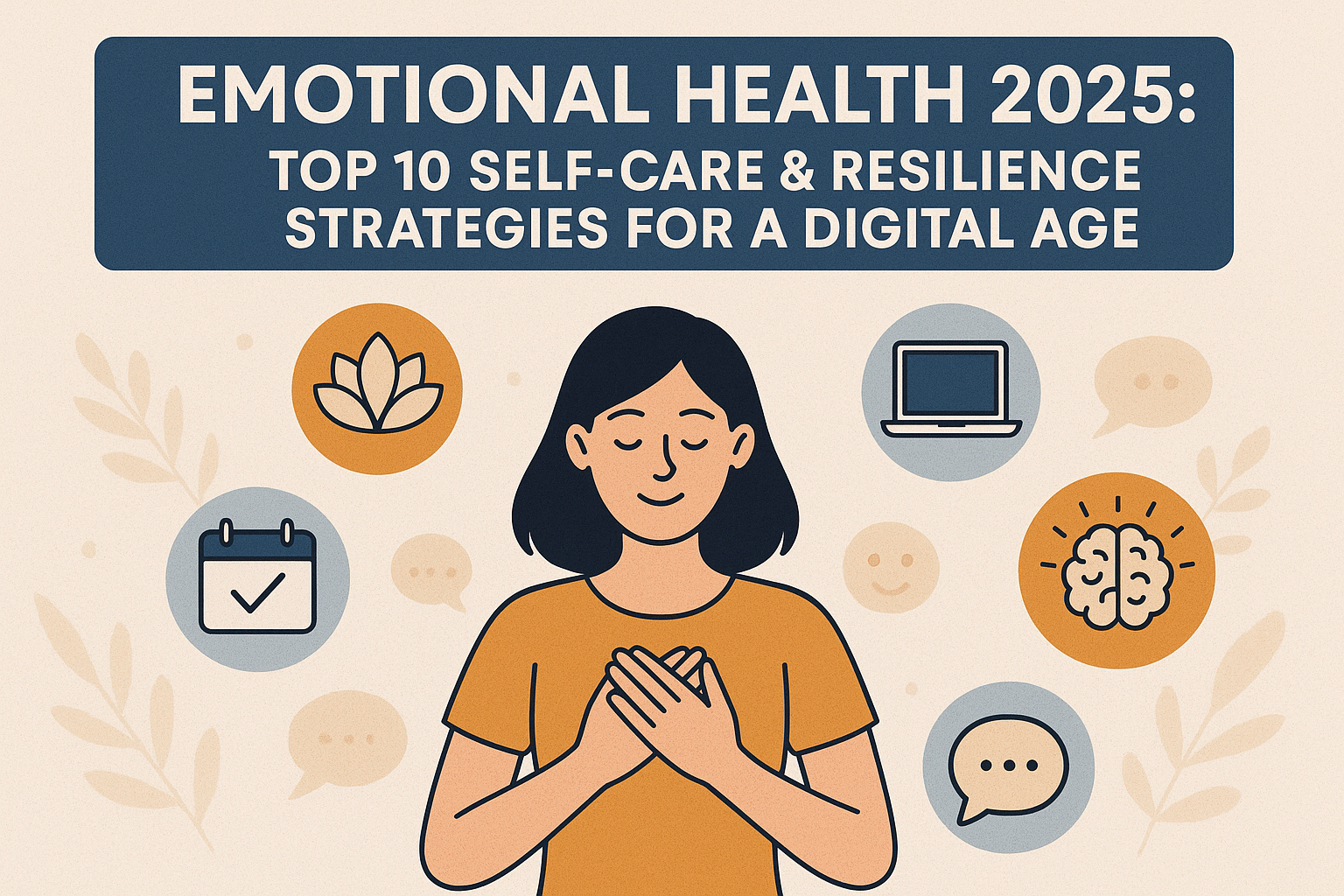Now that we are in the age of the most
intensive digital connectivity and endless bombardment of information, the
issue of emotional health has become so much more challenging and important. In
a vision of the complicated years of 2025, one major thing emerging is the
tendency of individuals to adopt holistic approaches to mental well-being in
attempting to meet the unique psychological demands of our technology-driven
world.
A Mental Landscape for the Digital Age
The meeting point of technology and mental
health brings forth both unprecedented challenges and innovations in coping
solutions. Continuing digital stimulation, social media pressure, remote work
dynamics, and uncertainty across the globe redefine everything about our
experience and even management of emotional wellness.
Top 10
Self-Care and Resilience Strategies
1. Intentional Digital Detoxing
In 2025, it is now the mainstream practice of
mindful technology consumption as a type of self-care. Successful digital
detoxification is not the total disconnection from technology but rather
involves:
• Structured zones within living and
workspaces that is entirely "tech-free."
• Using enhanced smartphone capabilities for
tracking and curbing screen time.
• Mindfully engaging in digital channels.
• Engaging offline time for connecting with
real people.
2. Customized Technologies for Mental Fitness
New technologies are now making nowadays
technology-based hyperpersonalized mental health support, in:
• AI-driven mental wellness apps to provide
individualized technique for meditation and stress management.
• Biofeedback wearable’s are able to track
emotional states and suggest real-time interventions.
• Machine learning platforms generate
personalized individual resilience training programs.
• Pre-set virtual reality experiences for
emotional regulation and trauma processing.
3. Holistic Stress Management Frameworks
Contemporary stress management has moved
beyond the relaxation techniques of yester years to include comprehensive
approaches which would now encompass:
• Cognitive training on a neuroplasticity
basis.
• Mental-health-focused efficacy in nutrition
optimization.
• Advanced breathing and heart rate
variability techniques.
• Integrative practices combining the western
and eastern schools of thought related to psychology and mindfulness.
4. Emotionally Supportive Communities
Digital platforms have completely
revolutionized emotional support through the following creations:
• A global, interest-based community for
mental health issues.
• Peer-supported virtual support groups.
• Sharing environments which are anonymous
but accountable.
• Culturally sensitive and linguistically
diverse support networks.
5. Emotional Intelligence and Digital
Literacy
Emotional intelligence is one soft skill that
relates to the new educational and national learning settings in terms of:
• Emotional regulation in the exchange of
digital communications.
• Understanding psychological effects from
different online methods of interaction.
• Identifying healthy boundaries for digital
relationships.
• Cultivating empathy in virtual
environments.
6. Adaptive Sleep and Recovery Strategies
Innovative sleep strategies are:
• Optimization technologies for circadian
rhythm.
• Blue light management and environment
design for sleep.
• Customized sleep monitoring and
modification systems.
• Integrated protocols for stress recovery.
7. Evolution of Mindfulness and Meditation
It has been possible to re-invent forms of
practice in meditation with technology:
• Neurofeedback enhanced meditation
experiences.
• Mindfulness Apps designed with gamified
elements.
• Immersive meditation environments.
• Complaints scientifically validated with
contemplative practice.
8. Integration of Physical and Emotional
Wellness:
That mind-body connection is now realized
even more through integrated wellness approaches such as:
• Precision nutrition for mental health.
• Movement practices that support an
emotional state.
• Chemical biochemical for stress management.
• Integrated comprehensive lifestyle
optimization strategies.
9. Trauma-Informed Resilience in an
Increasingly Digital World
Thus, at the moment, both individual trauma
and collective traumas are acknowledged, so resilience strategies now
incorporate the practices of:
• Trauma-sensitive practices in how people
communicate in digital spaces.
• Psychological safety in online spaces.
• Adaptive forms of coping with stressors
unique to the digital age.
• Compassionate self-regulation techniques.
10. Continuous Learning and Psychological
Flexibility
Mental wellness in 2025 will involve passing
through the following:
• Welcoming danger or change.
• Developing a psychological adaptability.
• An active basis for emotional education
throughout life.
• Cultivation of a growth-oriented mindset.
A
holistic vision of emotional health
As passage ensues through 2025, emotional
health is increasingly becoming conceptualized as a dynamic, ongoing process
instead of a destination. Through merging technology with scientific
understanding and compassionate self-awareness, emotional resiliency in
individuals is developed.
The most successful approaches will be those
that balance digital innovation with fundamental human needs for connection,
understanding, and genuine well-being.








0 Comments